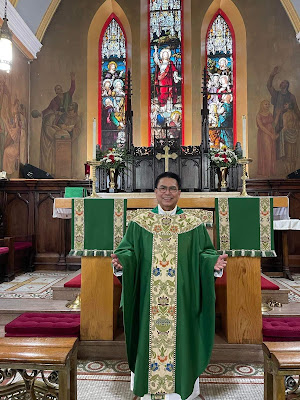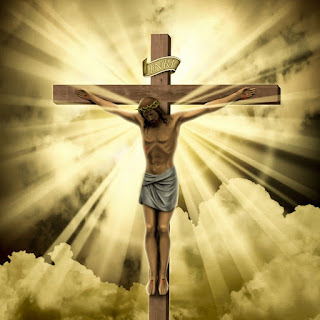MESSAGE TO FILIPINO AMERICANS ON THE 123RD PHILIPPINE INDEPENDENCE DAY
MESSAGE TO ALL
FILIPINO AMERICANS
ON THE 123RD PHILIPPINE INDEPENDENCE DAY
The Rev. Canon Dr. Winfred B. Vergara, Missioner for Asiamerica Ministries in the Episcopal Church, Delivered at the Filipino American celebration in Queens, New York.
To all my fellow Kababayans here in the United States, in the Philippines
and all around the world. Happy 123rd Philippine Independence Day.
Here in Queens, New York we are celebrating this event with an Open Air Mass and Group
Picnic here at Flushing Meadows Park. Thank you, Rev. Henry "Bong" Janiola and Gary Labao for organizing this event. Maybe this is a foretaste of more celebratory
events, the grandest one being a celebration of the end of COVID pandemic.
I think it is significant that this celebration is jointly sponsored by the
Iglesia Filipina Independiente and the Federation of Filipino
Concerns (NAFCON) and Migrante. It is significant because in history, the
struggle for Philippine Independence was founded on two dreams: one, an
independent Filipino Nation enrolled in the family of free and inter-dependent
nations; two, an independent Filipino Church enrolled in the family of free and
inter-dependent churches.
The Filipino People were colonized by Spain for over 300 years and while
there were positive influences they injected to Filipino culture, such as
Christianity, those many years were also oppressive. Our ancestors were
enslaved, treated as inferior human beings, denied freedom and human dignity.

And so in June 12, 1898 after many martyrdoms, such as the three Filipino
priests (Burgos, Gomez and Zamora) and of Jose Rizal and other heroes, the
Filipino people finally rose up in a Revolution, put an end to Spanish
colonialism, declared independence and established a republic led General
Emilio Aguinaldo.
In an unfortunate twist of history, that first Philippine Republic abruptly ended when the Americans arrived and took over the Philippines from Spain. Unknown to the revolutionaries, in the Treaty of Paris, the Spanish government ceded the Philippine territories to the United States to the tune of $20 million dollars! Very cheap.
 |
| Kawit City in Cavite is where General Emilio Aguinaldo proclaimed Philippine Independence from Spain in June 12, 1898 |
So instead of Philippine Republic, we became a Commonwealth of the United
States. It took another 50 years, in 1946 when the Philippines finally became a
truly independent nation. The new “Republic of the Philippines,” however,
considered July 4, 1946 not as second independence day but “Filipino-American
Friendship Day.”
I think it is important to remind ourselves of our history time and time
again because it enables us to know ourselves better. As the slogan says, “No
history, no self; know history, know self.”
It is also important that we know how to respond appropriately to
history. I am reminded of a Pinoy named Juan. He attended a class in Philippine
history and was told that the Spaniards maltreated his ancestors, enslaved them
and killed many of them. So when he got out of the class, he was furious and he
started looking for a Spaniard. Alas, he found a Spanish-looking guy who speaks
Spanish. He punched him on the nose. The history professor came out and said,
“What are you doing?” Juan replied, “I am avenging my ancestors!” The professor
replied, “But that happened long time ago and the guy that you punched is not a
Spaniard but a Mexican whose ancestors were also enslaved!”
So in reference to Philippine Independence, how should we as Filipinos
here in North America respond to Philippine history and destiny?
First, we should discern our role in our country of origin (the
Philippines) and the country we adopted as our second home, the United States.
We are living in paradox. Do you know what is a paradox? “A paradox is a
seemingly absurd or self-contradictory statement or proposition that when
investigated or explained may prove to be well founded or true. What is our
paradox?” (Wikipedia)
We are Filipinos but we live in North America. Some of us are already
American citizens. Some of us are even born here. Many of us may even stay here
forever or until we die. And so we are living in two worlds. The question we must
ask ourselves is: Are we “Filipinos in America” or are we “Filipino Americans?”
If our answer is “Filipinos in America,” then we are only here in body. Our
minds and spirits are still in the Philippines. We only look at America as the
country we earn our income so we can send some to our families, our churches, our
relatives in the Philippines. Our focus, our loyalty and our consciousness are
set only on Philippine affairs. We are more interested on Philippine events
than on what’s going on in America. We watch the news and drama at The Filipino
Channel (TFC) but not the mainstream US media and cable TV. We care nothing
about American politics and do not vote even though we are American citizens.
Yes, there are still some Filipino who are U.S. citizens that do not exercise
their right to vote.
My friends, if we continue to live and behave like that, then we will
remain “foreigners forever” in America. We will not make a mark in this country
which has helped us to live.
So let me offer a proposal. Why don’t we consider ourselves and treat
ourselves as Filipino-Americans? Yes, we are Americans of Filipino ancestry. We
come from the Philippines but are carving our future as Americans? We are Americans!
No less than the Americans who came from Germany, the Italy, England, Ireland, Africa,
Mexico, etc. who have come here and become part of this multiracial,
multicultural America?
As Filipino Americans, how shall we pray, think and act?
First, we must pray for the country in which we live. It’s future is
our future and its life our life. The Bible says in Jeremiah 29:7 “Seek the peace and prosperity of the country to
which I have carried you into exile. Pray to the LORD for it, because if it
prospers, you too will prosper."
Second, we must offer our gifts to the betterment of this
country. It’s not only “when you are in Rome, do what the Romans do.” It’s also
contributing your Filipino gifts, your Filipino talent, your Filipino culture
to American life.
Maybe one of the gifts we
can offer to the American Society in building a new and better world is the
ideal of Family. The Filipino concept of family is extended. It goes beyond
bloodlines. It goes beyond nationality.
In the Bible, Jesus was
told that his mother and brothers were outside the Temple and looking for him. The
response of Jesus was “Who are my brothers and my mother?” Then he pointed to
all those around him and saying, “these are my brothers and my mother; whoever
does the will of God are my brothers and my sisters and my mothers.” It is not
that Jesus was rejecting his own biological family; it is that He was adding
members to His family---beyond his bloodlines. .
From my experience of
Filipino culture, we understand what the Christian Family is all about. My wife
and I are missionaries and have been to many parts of the world. We do not have
children of our own but we have many spiritual children and have found families
in the cities that we have lived and in the churches that we have served. Essentially,
home is where you are loved and accepted, home is where you find welcome and
friendship.
Third, we must
get involved in the affairs of this country. Let us get education, involve in the local church and
community, and if you have a calling and opportunity, get into politics. I pray
for more Filipino Americans to shine in the political arena in the United
States. My friend, Mayor Jose Esteves of Milpitas, California often say that “politics,
along with education, is an equalizer in American society.”
 |
| These are some of the notable Filipino American politicians. In New York, we are hoping for Steven Raga to win as Councilman for District 26 in Queens, New York City. |
America is a beacon of democracy, freedom and equal opportunity. We must pray that it continues to be that way. Let us be in solidarity with those who are in fighting against racism, social injustice, prejudice and bigotry. Let us find allies from all cultures to solve the problem of Asian Hate and join forces with all races for equal protection under the law and respect for the dignity of every human being.
The success of our
advocacy in our adopted country, will also help our advocacy in our own country
of origin.
In October 3, 2006 Bishop
Alberto Ramento, the 9th Obispo Maximo of the Iglesia Filipina
Independiente was murdered for speaking against social injustice and
extrajudicial killing in the Philippines. After his death, several other
priests were also targeted by malevolent forces in the para-military and so the
IFI sought assistance from the Episcopal Church.
 |
| The Most Rev. Alberto Ramento became so committed to the issue of social justice |
Canon Brian Grieves of the Peace and Justice Office and I as Asiamerica Missioner were sent by Presiding Bishop Frank Griswold to deliver our protest (Statement of Concern) to the Philippine Ambassador in Washington DC which we did.*
With the help of the TEC Office of Government Relations (OGR), we proceeded to the U.S. State Department** and asked their help to request President Gloria Macapagal Arroyo
to provide security to our Philippine clergy who were in danger, which they
did. That advocacy was followed by the visit of Presiding Bishop Katharine Jefferts Schori to the Philippines and advocacy with then U.S. Ambassador to Philippines Kristie Kenney.
What made the U.S. State Department convinced was what Canon Brian Grieves and I said to them, “It is in the interest of the United States government to help protect and preserve the integrity of the Philippines as a beacon of social justice and human rights because the Philippine government is the mirror of American democracy in Asia. The failure of the Philippine democracy is a failure of American democracy.”
HAPPY PHILIPPINE INDEPENDENCE
DAY! MABUHAY ANG PILIPINO. GOD BLESS FILIPINO AMERICANS!
NOTES:
* The Philippines Ambassador to the US at that time was the late Hon. Willy Gaa, who incidentally has family background in the Iglesia Filipina Independiente.
**The U.S. Department of State manages America's relationships with foreign governments, international organizations, and the people of other countries. The management of all of these relationships is called diplomacy. The Episcopal Church has an Office of Government Relations (OGR) in Washington DC.







Comments
Post a Comment